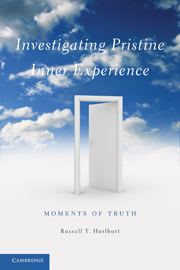Book contents
- Frontmatter
- Contents
- List of Figures and Tables
- Preface
- Acknowledgments
- 1 Moments of Truth
- 2 Fragmented Experience in Bulimia Nervosa
- 3 Apprehending Pristine Experience
- 4 Everyday Experience
- 5 Moments Are Essential
- 6 Experience in Tourette's Syndrome
- 7 The Moment (Not): Happy and Sad
- 8 Subjunctification
- 9 Before and After Experience? Adolescence and Old Age
- 10 Iteration Is Essential
- 11 Epistemological Q/A
- 12 A Consciousness Scientist as DES Subject
- 13 Pristine Experience (Not): Emotion and Schizophrenia
- 14 Multiple Autonomous Experience in a Virtuoso Musician
- 15 Unsymbolized Thinking
- 16 Sensory Awareness
- 17 The Radical Non-subjectivity of Pristine Experience
- 18 Diamonds versus Glass
- 19 Into the Floor: A Right-or-Wrong-Answer Natural Experiment
- 20 The Emergence of Salient Characteristics
- 21 Investigating Pristine Inner Experience
- Appendix: List of Constraints
- References
- Index
9 - Before and After Experience? Adolescence and Old Age
Published online by Cambridge University Press: 05 June 2012
- Frontmatter
- Contents
- List of Figures and Tables
- Preface
- Acknowledgments
- 1 Moments of Truth
- 2 Fragmented Experience in Bulimia Nervosa
- 3 Apprehending Pristine Experience
- 4 Everyday Experience
- 5 Moments Are Essential
- 6 Experience in Tourette's Syndrome
- 7 The Moment (Not): Happy and Sad
- 8 Subjunctification
- 9 Before and After Experience? Adolescence and Old Age
- 10 Iteration Is Essential
- 11 Epistemological Q/A
- 12 A Consciousness Scientist as DES Subject
- 13 Pristine Experience (Not): Emotion and Schizophrenia
- 14 Multiple Autonomous Experience in a Virtuoso Musician
- 15 Unsymbolized Thinking
- 16 Sensory Awareness
- 17 The Radical Non-subjectivity of Pristine Experience
- 18 Diamonds versus Glass
- 19 Into the Floor: A Right-or-Wrong-Answer Natural Experiment
- 20 The Emergence of Salient Characteristics
- 21 Investigating Pristine Inner Experience
- Appendix: List of Constraints
- References
- Index
Summary
Recall that in Chapter 2 we explored the pristine experiences of bulimic women; we discovered fragmented multiplicity, multiplicity that increases with the urge to vomit and decreases after vomiting. Those results were unpredicted and provocative, which we took as evidence that carefully examining moments of truth might unlock experience in ways that reveal characteristics of people that are obvious and immediately at hand (the hay in the haystack) but systematically overlooked by almost everyone.
Now, we again focus on the pristine experience portion of the moments ↔ experience ↔ genuinely-submitting-to-the-constraints co-determination by exploring the experience of adolescents and older adults. We will see that we get some perspectives on the development of experience that, as in bulimia, have rarely if ever been noticed.
Our aim here, as in Chapter 2, is to demonstrate the productivity of carefully focusing on experience. I will make a few provocative speculations about the development of experience. I do not intend this chapter to be anything remotely resembling a treatise on developmental psychology. Our samples of younger and older individuals are not as large and not as well replicated as the bulimia studies of Chapter 2. However, we have seen enough to make some provocative suggestions, enough to demonstrate the essentiality of carefully observing experience.
SPECULATION 1: FEELING IS AN ACQUIRED SKILL
We use the term “feelings” in the same way most psychologists (Kagan, 2007) do: to refer to emotion experience.
- Type
- Chapter
- Information
- Investigating Pristine Inner ExperienceMoments of Truth, pp. 125 - 151Publisher: Cambridge University PressPrint publication year: 2011



